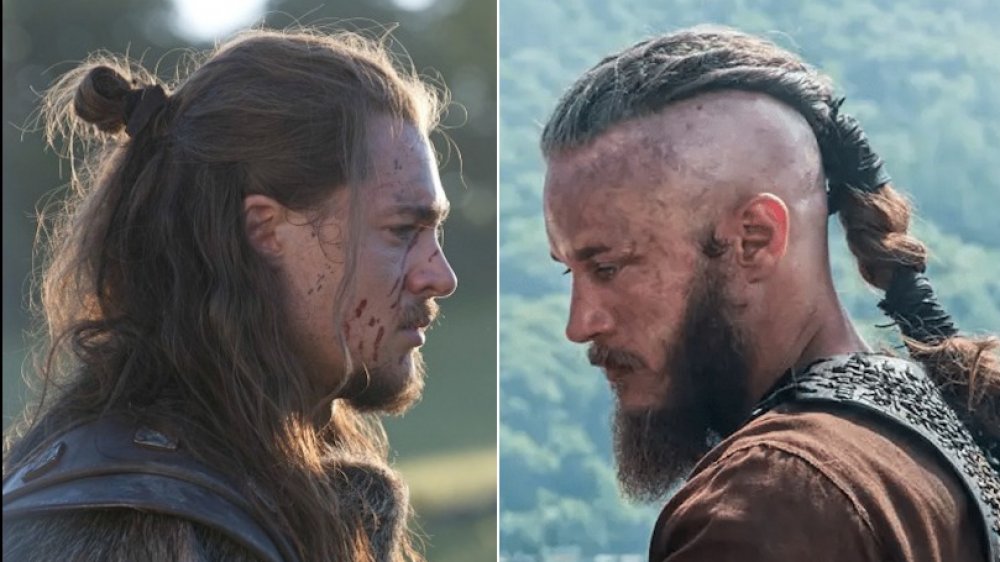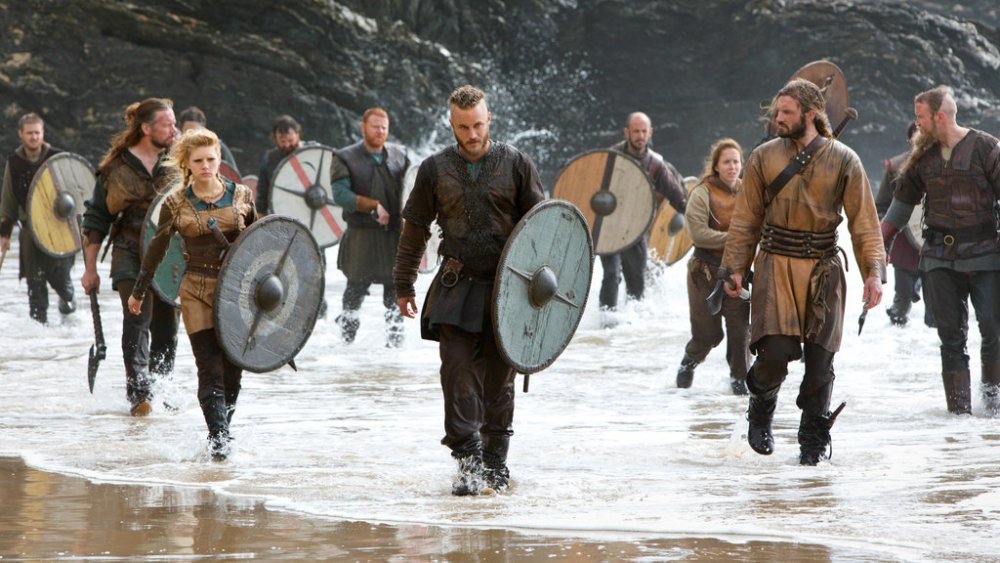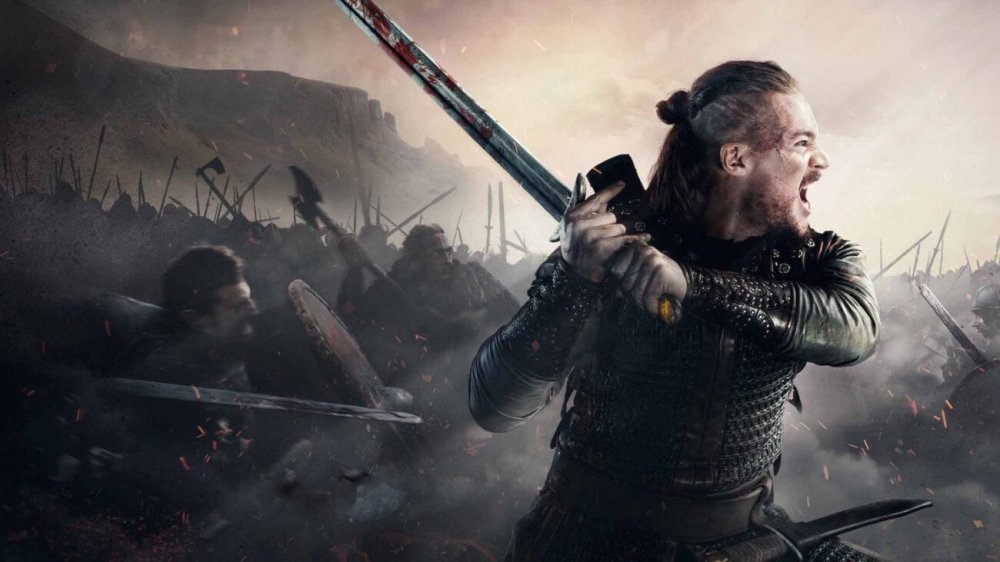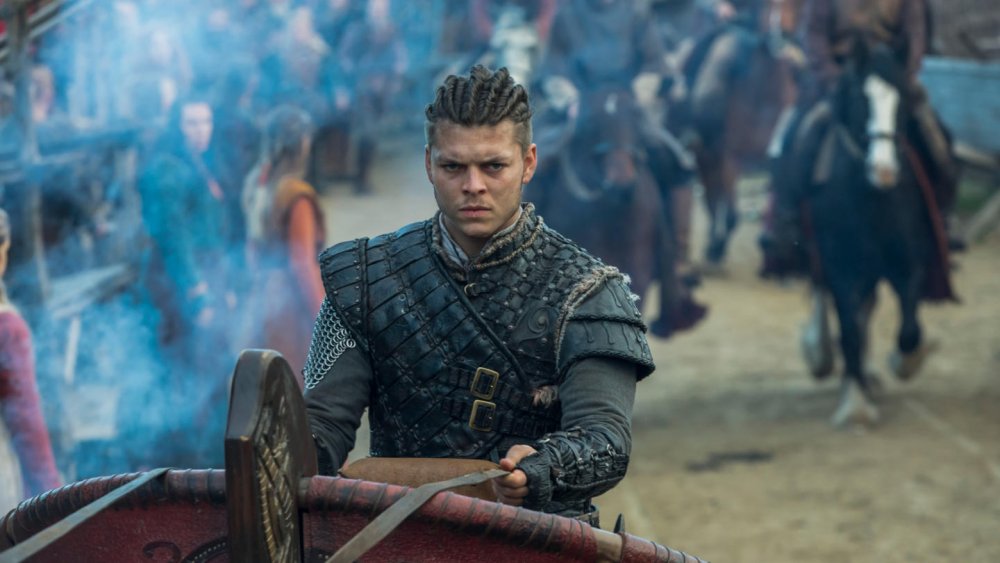How The Last Kingdom Differs From Vikings
If you're a fan of medieval costume dramas, chances are good you've already devoured History's Vikings series as well as The Last Kingdom on Netflix. On the surface, the two shows appear to have a lot of crossover. They both purport to dramatize the historical conflict between the Saxons who occupied most of England in the Ninth and Tenth centuries and invading Vikings — a loose conglomerate of Scandinavian peoples, mostly from Norway and Denmark, but also from parts of Sweden, modern-day Germany and The Netherlands.
Fun fact: "Viking" wasn't considered an actual ethnicity in the Viking Age, but rather a verb. To "go viking" was to embark on a foreign raid, as Bernard Cornwell aptly points out in the historical note to his first Uhtred book, also entitled The Last Kingdom.
Many viewers of both series have observed that the two shows seem to have substantial overlap in their stories. Historical figures like the Scandinavian Lothbrok kin and the famous King Alfred The Great of Wessex appear on both series, though in differing capacities. Important locations and battles are depicted on both shows as well, like the brutal sack of the Northumbrian monastery Lindisfarne and the battle for control of Eoferwic (modern-day York).
With all these synchronicities, it's reasonable that some fans think of Vikings and The Last Kingdom as two sides of the same conflict, with the former presenting the Scandinavian point of view and the latter the Saxon. While there are elements of this reading of the two series that may be valid, the truth is: The Last Kingdom and Vikings have as much in contrast as in common.
The dates are fuzzy, but Vikings definitely begins before The Last Kingdom
The confusion was well laid right from the start of both series. Both shows seem to depict the same historical raid at Lindisfarne in 793 as their respective inciting incidents. On The Last Kingdom, the raid of Lindisfarne marks the Danish arrival in Northumbria, where protagonist Uhtred (Alexander Dreymon) is a young lord of Bebbanburg. This raid leads directly to the kidnapping of young Uhtred and his life as a ward of the Danish Jarl Ragnar (not to be confused with Ragnar Lothbrok).
Vikings also depicts this raid, but from the Scandinavian perspective. Ragnar Lothbrok (Travis Fimmel) leads a raiding party from Kattegat all the way across the sea to England. Ragnar's discovery and sack of Lindisfarne is hailed as a great victory for Norway, an accomplishment that eventually leads to him taking control of Kattegat and becoming Norway's most famous king.
At this point, it seems like the two series are aligned, but The Last Kingdom launches into a time jump. We cut past most of Uhtred's childhood and pick up with him again when he's on the verge of returning to Saxon life (under duress) as a warlord sworn to King Alfred of Wessex (David Dawson). The Last Kingdom provides us with plenty of dates for the action, whereas Vikings is more miserly with this intel. Regardless, it's hardly useful information since Vikings creator Michael Hirst has little regard for dates. Judging by the events depicted on screen, however, almost the entirety of Vikings' first four seasons takes place during The Last Kingdom's time jump.
The first wave of Scandinavian invasions, Ragnar's rise and fall, the birth of his many brutal sons, his death in King Aelle's pit of snakes, the death of King Ecbert in Wessex, the contested coronation of King Alfred — The Last Kingdom basically skips over all of it, though with good reason. Hirst set out to create a show about Viking heroes, and Ragnar Lothbrok is the most important figure from the sparse historical accounts we have. Bernard Cornwell, on the other hand, set out to write a story about the creation of England. In that story, Ragnar Lothbrok is little more than a footnote; Alfred the Great and his progeny are the main event. These are two very different stories that just happen to concern a few of the same players and events.
Bernard Cornwell is a historian as well as a storyteller
Both series blend quite a bit of fiction with their history, but in different ways. As alluded to above, The Last Kingdom is adapted from author Bernard Cornwell's Saxon Stories, a thirteen-book series of historical fiction novels set to conclude this October with the publication of War Lord. Cornwell is one of the most accomplished and prolific historical fiction authors currently working in English. The depth of research and attention to detail that go into each of his projects is truly mind boggling. Just to keep himself honest, he includes a historical note at the end of each of his books to describe how he worked with primary sources and where he took creative liberties in service of the tale.
As a result, both the Saxon Stories and The Last Kingdom build their plots on top of a rigid scaffolding of true events. As Cornwell has himself stated, the Saxon Stories begin with Lindisfarne because that event marks the beginning of the Viking Age, and they will end with the Battle of Brunanburh because that event marks the official formation of a unified Kingdom of England under Alfred's grandson Aethelstan I. So far, The Last Kingdom has strayed from its source material in increasingly impactful ways, though it still seems likely that we're ultimately heading to the same place Cornwell intends to take us in October.
Remember, in the final season of Vikings, King Alfred is still a young man. The ultimate climax of The Last Kingdom is set to take place during the reign of his grandson — decades after Vikings makes its final bow.
Michael Hirst never lets the facts get in the way of a good story
Michael Hirst, on the other hand, is an Emmy Award-winning purveyor of pop culture, first and foremost. His show is a hodge-podge of Norse mythology, spotty Scandinavian history, and folkloric stories from the Sagas. He's assembled these elements for maximum dramatic impact — no sin in the world of TV. Vikings' Alfred the Great (Ferdia Walsh-Peelo) is without a doubt the same person as The Last Kingdom's Alfred the Great, even though the Vikings version takes the historical King of Wessex woefully out of the timeline. Our best sources from the 9th century tell us that Alfred was the king who repelled the Great Heathen Invasion — depicted as a revenge raid for the killing of Ragnar on Vikings. Historically speaking, Alfred should have been King of Wessex already at this point, though his historic triumph over the Scandinavians may be forthcoming in the last half of season 6.
It's not entirely Hirst's fault. The Scandinavian historical record has a lot more breathing room than the meticulous annals from King Alfred's court at Winchester. Cornwell had the Anglo-Saxon Chronicle to work with. Hirst wanted to tell the Viking side of the story, and to do so he had to rely on a very spotty record, which has become more-or-less indistinguishable from myth. The history of medieval Scandinavia practically begs for someone like Hirst to come along and fill in the gaps.
So The Last Kingdom and Vikings are very different series with different mission statements, but they sure make appealing tandem viewing. Shield wall!



